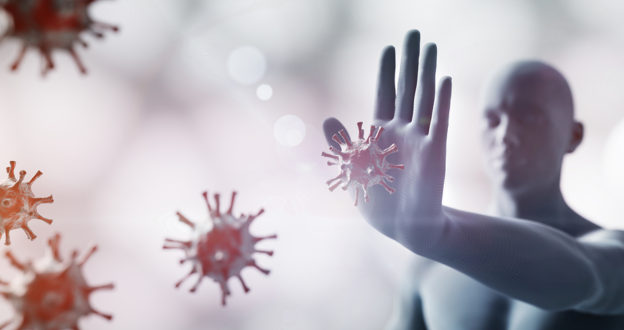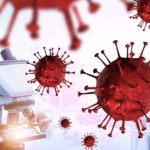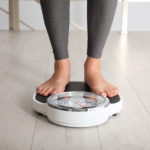By David Blyweiss, M.D., Advanced Natural Wellness
April 22, 2020
These last few weeks have been interesting and unsettling to say the least…
I’ve watched – right along with you – to see how our government and society responds to the COVID-19 crisis. Some very interesting trends are starting to appear…
But first…
A few weeks ago, I shared some natural ways to boost your immunity against coronavirus. Since then, readers have been writing in with even more questions.
So, I thought I’d share a few more ideas for how to boost your immunity against this virus. Let’s start with some of the most “asked about” nutrients.
Vitamin C
Yes, Vitamin C is an excellent addition to your daily routine. It helps prevent infections caused by viruses and bacteria. Take at least a couple of grams twice a day … but stay away from those really sugary products.
Vitamin C cannot be produced by your body, so you’ll need to get it from an outside source. It’s been shown to shorten the duration of infections. And higher doses can act as an antihistamine and anti-inflammatory. It’s actually been and now being used safely and effectively at some hospitals with informed medical staff as an IV treatment for bacterial sepsis.
Open your arteries, improve blood flow for a new health miracle...
Did you know your circulatory system has over 60,000 miles of arteries, veins and other blood vessels, if stretched end to end?
But as you age, your blood vessels undergo changes, which may cause them to stiffen, thicken and get clogged.
GOOD NEWS! Doctors have now identified a “Miracle Molecule” inside your arteries that helps OPEN your arteries and IMPROVE blood flow.
It’s what Dr. Valentin Fuster calls it, "One of the most important discoveries in the history of cardiovascular medicine."To you, that means...
- Healthy blood pressure
- Sharper mind and memory
- Skyrocketing energy and muscular strength
- Increased pleasure and passion in the bedroom
- Improved circulation to every cell and organ in your body
Go here to discover a new natural way to significantly boost the levels of this miracle molecule in YOUR body NOW!
This makes perfect sense when you consider how doctors in New York City hospitals are using high doses of Vitamin C to treat coronavirus patients.[1]
In fact, since vitamin C has anti-viral properties, it’s one of the things I take when I get on an airplane as a short term anti-viral. So, yes. Vitamin C is definitely a good supplement to take during these times.
B-Vitamins
Next, we should take a look at your B-complex vitamins. These vitamins are a group of eight essential nutrients which influence your body’s organs and systems… including the immune system.
Each one of the B vitamins plays a unique role. For instance, vitamins B1 B5 and B6 help your immune system operate and is recommended to help with stress and fatigue. It helps provide a boost of energy.
B2 has immune modulatory effects and helps with inflammation. Another B-vitamin, Niacin, helps with the migration of immune cells.
Then, vitamin B12 may be beneficial in the treatment of virus-related chronic disease.[2] Since older people are more likely to be deficient in B12, I recommend a sublingual dose of 1000-5000mcg B12 three times a week.
A Healthy Diet Can Help Protect You From Infection
Taking your vitamins is important. But the foods you choose on a daily basis can have a huge impact on your health.
These days, it’s even harder to make those healthy decisions. Think about it… our food landscape has changed a great deal over the last few decades.
What was once just called “food” is now “organic food.” And today, people are exposed to many more unhealthy food options than in years past. Poor diet and nutrition often leads to chronic disease. And chronic disease raises your risk of infection.
The World's Quickest Solution for Ending Prostate and Urinary Misery
This has recently been revealed to be one of the only real breakthroughs in prostate health.
The seeds of a strange fruit (sometimes called "Chinese Apples") hold powerful phytonutrients that are a revolution in prostate health.
In fact, UCLA and Veterans Administration research have now proved this to be true.
Not only that, but it may be the worlds quickest solution for ending prostate misery.
Simply stated, these phytonutrients represent a huge step beyond beta sitosterol, saw palmetto, and other phytosterols alone.
Simply click HERE if you want to have fast prostate relief...restful, uninterrupted sleep...no more constant "urges to go"...enhanced virility...and optimal prostate support for life.
Now, more than ever, we are seeing how smart food choices can help protect you from a COVID-19 infection. Here are a few food choices I recommend to help with immunity:
Keep Your Gut Microbiome Healthy
Most of your immune system is actually in your gut, so consider how the foods you eat impact your microbiome. Eating foods like kimchi and other fermented vegetables can help promote the growth of healthy gut bacteria.
You should also eat plenty of colorful fiber-filled fruits and vegetables to make your microbiome happy and healthy. And it will boost your immune system. (While you’re at it… stay away from those refined sugars and carbs!)
Kombucha is a great choice if you’re looking for a fizzy and delicious drink. The gut-friendly probiotics within this drink help protect you against a number of diseases.
Plus, when brewed from black or green tea, kombucha actually has antifungal and anti-microbial properties.[3] I enjoy a glass of this fermented tea every evening with my meal.
Avoid Dairy, Alcohol, and Gluten
I’m not normally a fan of dairy. But now, more than ever, you may want to reconsider how much you are eating every day. High dairy consumption is associated with increased risk of several immune-related disorders.
For instance, one study found that cow’s milk may contribute to the development of diabetes.[4] It has also been linked to a higher risk of developing multiple sclerosis – a disease where your own immune system attacks your nervous system.[5]
Alcohol really is a killer. If you can avoid it, great. If not, stick to just one glass of red wine at nighttime. Studies have shown that drinking changes the gut microbiome and too much alcohol can actually harm the immune system.[6]
And lastly, let’s talk about gluten. Gluten is a protein most commonly found in grains like wheat, barley, rye and others. It is inherently inflammatory and usually sprayed with glyphosate (Round Up) for dessication and harvesting if not just to get rid of the rye grass weeds affecting wheat harvest. So, try eating grains like amaranth, buckwheat berries, millet, or quinoa instead.
Why Are Some People Getting Sick While Others are Healthy?
Remember those “trends” I mentioned before?
Well, I recently heard a report on NPR which just now is talking about certain US communities who are getting hit harder than others.[7] I’m just waiting for people to connect the dots.
Some cultures within the country maintain their diets with traditional foods; side dishes of white rice, black beans, and refined white flour breads. Then, there are those populations located in food deserts who cannot get enough, if any, fresh fruits and vegetables; eating processed foods primarily because that’s what’s been made available to them.
Often, these factors go hand in hand with segments of the population who suffer from diabetes, hypertension, and obesity. These people are much more at risk for a disease like COVID-19.
So what do we know from all of this?
We know people with chronic diseases are being hit the hardest by the coronavirus. And most of the chronic disease we’re looking at is related to diet, lifestyle, and environment.
So, healthy food choices can make a world of difference when you are trying to ward off infection. Eating healthy… stay healthy.
Sources:
[1] WorldHealth.net. “New York Hospitals Utilizing Vitamin C.” 25 March 2020. https://www.worldhealth.net/news/new-york-hospitals-utilizing-vitamin-c/
[2] Spinas, Enrico, et al. “Crosstalk between vitamin B and immunity.” J Biol Regul Homeost Agents 29.2 (2015): 283-8 https://www.academia.edu/download/41848579/_JBRHA29-2.pdf#page=21
[3] Battikh, Houda, et al. “Antibacterial and antifungal activities of black and green kombucha teas.” Journal of Food Biochemistry, Vol 37, Issue 2. 2012. https://onlinelibrary.wiley.com/doi/abs/10.1111/j.1745-4514.2011.00629.x
[4] HC Gerstein. Cow’s Milk Exposure and Type I Diabetes Mellitus. A Critical Overview of the Clinical Literature. Diabetes Care. 1994 Jan; 17(1):13-9. Available here: http://www.ncbi.nlm.nih.gov/pubmed/8112184 (accessed Feb. 6, 2016).
[5] D Malosse, H Perron, A Sasco and JM Seigneurin. Correlation Between Milk and Dairy Product Consumption and Multiple Sclerosis Prevalence: A Worldwide Study. Neuroepidemiology. 1992; 11(4-6):304-12. Available here: http://www.ncbi.nlm.nih.gov/pubmed/1291895 (accessed Feb. 6, 2016).
[6] Cook, Robert T. “Alcohol abuse, alcoholism, and damage to the immune system—a review.” Alcoholism: Clinical and Experimental Research 22.9 (1998): 1927-1942. https://onlinelibrary.wiley.com/doi/abs/10.1111/j.1530-0277.1998.tb05900.x
[7] Summers, Juana. “Racial Disparities in COVID-19 Impact Emerge As Data Is Slowly Released.” NPR.org. 9 April 2020. https://www.npr.org/2020/04/09/831174878/racial-disparities-in-covid-19-impact-emerge-as-data-is-slowly-released







